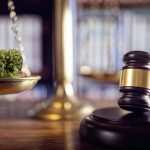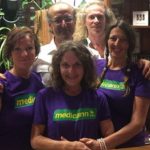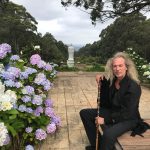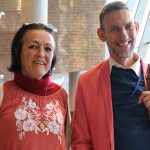Not Guilty on All Charges: An Interview With Medicinal Cannabis Crusader Dr Andrew Katelaris
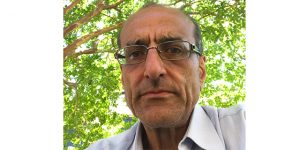
At around noon on Thursday, a jury found renowned medicinal cannabis practitioner Dr Andrew Katelaris not guilty on a number of very serious charges relating to the supply and manufacture of cannabis medicines.
Representing himself in court, Dr Katelaris argued a defence of medical necessity, meaning that his patients’ needs were so dire that it was necessary for him to break the law, so he could provide them with life-saving cannabis medicine.
This is a victory not only for the doctor, but for cannabis medicine producers and patients throughout the state, as a precedent has been set for future cases where cannabis medicine production is being prosecuted.
NSW police raided Dr Katelaris’ house in May last year, after he appeared on television and in a calculated act of civil disobedience, revealed his clandestine medicinal cannabis laboratory to the entire nation.
It took the jury at the Downing Centre District Court less than an hour to acquit the doctor on seven charges, which included the supply and manufacture of a large commercial quantity of cannabis oil. Both of these offences carry a maximum penalty of life imprisonment.
A cannabis pioneer
Dr Katelaris’ involvement with cannabis started in the early 90s when he began importing hemp for the manufacture of clothing. He was granted the first NSW industrial hemp licence in 1997, and in 2001, he was issued with a licence to grow plants for medical research.
Over later years, the doctor began providing medicinal cannabis to patients, including children with serious seizure disorders like intractable epilepsy. He found that this illicit medicine is able to provide those in need with a quality of life that traditional western medicines can’t.
Dr Katelaris remarked a few years back that once he saw the effects of what he was doing and “the clear superiority of cannabis therapeutics” he couldn’t turn back. He also made clear that he’d be mad not to supply the medicine to kids with serious diseases.
And it’s not the first time that Dr Katelaris has put himself on the line for the herb. Back in 2005, he went before the court over the cultivation of 48,000 plants. At the time, he was told he could be locked up for 20 years, but in the end, he walked away with a one year good behaviour bond.
An expected victory
The Turnbull government passed legislation almost three years ago to establish a legal medicinal cannabis market. But, the slow-moving system is so bogged down in red tape that the majority of the estimated 100,000 Australians using medicinal cannabis can’t access or afford legal medicines.
The doctor is fighting for the right for citizens to produce whole plant products that he asserts are far superior to any pharmaceutical cannabis medicines that appear on the market. And despite the severity of the charges against him, he was always confident he’d win.
Sydney Criminal Lawyers® spoke to Dr Katelaris about the effect he expects his victory to have upon medicinal cannabis use and supply, the months he needlessly spent in prison on remand, and why there’s absolutely no reason to turn cannabis into a pharmaceutical drug.
Firstly, you just stood trial facing a range of very serious charges, including the supply and manufacture of cannabis oil and one count of dealing with the suspected proceeds of crime.
Today, you were found not guilty on all charges, Dr Katelaris, how are you feeling?
Obviously, I’m happy. Even though most people seemed to have, I didn’t doubt that we could run a successful necessity defence. In fact, the crime was disclosed in order to run the necessity defence, because it hadn’t been done before.
So, I did certain actions that led to my arrest. It wasn’t that police discovered it. We intended to be arrested. And we intended to test necessity as a defence when it applies to cannabis medicines. And we did that very successfully.
So, you’re saying that when you appeared on television and revealed your cannabis laboratory, you were intending to be arrested?
Yes. You would have to be demented to think you could go on TV and show a quantity of cannabis and not have any consequence.
As you’ve mentioned, you were arguing a defence of medical necessity. What was the gist of your argument?
The necessity defence has three elements. The first element is that the otherwise criminal act has to be done to prevent a risk of serious harm or death. That’s the first element.
The second element was that there has to be an imminence to that threat and no reasonable alternative. And the third one is the good achieved has to be in proportion to breaking of law.
The proceeds of crime was easy, because the widow of the person who left me that money in a will to advance our work with children with epilepsy came to court, or appeared on AVL, and explained exactly what he did.
In terms of proving necessity there were two professors. There was professor Beran and professor Laurie Mather for the prosecution and the defence respectively.
Beran is someone who has pioneered the conduct of clinical trials in private practice, but he was investigated for receiving kickbacks from the drug companies for doing such things. He was clearly a partisan witness on their part and his evidence was fairly easy to pick apart.
In his summing up, the judge raised the possibility that he couldn’t even be considered an expert, because he knew so little about cannabis.
I asked him a few searching questions about the clinical pharmacology of cannabis and he was unable to answer them. And he eventually admitted that his source of information was Google.
Professor Mather is an enormously experienced person, who’s appeared on parliamentary committees for decades. He impressed the judge and the jury once more. So, that was the experts.
But, there were two real winners here. One was Deisha, one of our star patients. Her mother appeared by AVL and told of the transformative effects and showed a letter from her paediatrician saying that they considered nearly miraculous what had been achieved with Deisha.
And another very sad case was that of Suli Peek. She died after being admitted to Lady Cilento Hospital in Queensland for unrelated problems probably caused by medication she’d been given prior for gastrointestinal issues.
And they insisted on withholding the cannabis and she died. It was tragic. We brought in Mr Peek to show how callous the system was.
So, the elements were fairly easy to satisfy. And the judge was acutely aware of the ramifications of me being unrepresented.
I spent months applying for Legal Aid. I knew this was going to be a technical argument. And I spent a lot of time hassling them to support me and they eventually did. They assigned a solicitor.
As the trial got closer, I became more concerned as I was requesting conferences to get strategies worked out, and in the end, the solicitor said there’s not a big enough budget to have a pre-trial conference.
So, I said, “Goodbye. If that’s your level of casualness that you’re approaching this with, then I’ll run it myself.” I mean, I’d read all the literature and I was quite confident.
NSW District Court Judge Clive Jeffreys presided over the four week trial. What did he put forth in his summing up? And what seemed to be his overall opinion of the case?
Over the four weeks, there was firstly, I won’t say hostility, because he was balanced. Some of them can’t hide their emotions. But, he was sort of neutral, just looking at another drug criminal.
At the end of the first week, there was a total change in how interested he was in the case. He was leaning into the evidence that was given. Every now and then, you’d be talking to the jury and you’d look over and he had this fascinated look on his face.
There’s a little ten minute vignette on me made by this group called PLGRIM. It’s on YouTube. I have to say it shows me in a very favourable light. And the police used that as part of their prosecution evidence. It’s really bizarre.
It shows me in a lab. It shows all these children getting well and grateful parents. They were just oblivious to the fact that they were providing me with ammunition.
Prior to your trial, you said that this case was a political one, as it deals with the right of citizens to be able to access and use cannabis medicines.
So, looking at the broader aspects of this, what would you say is the significance of the outcome of your case?
The one case by itself is a small victory. But, what we want to do is to use the principles raised in this to defend other oil makers who are facing criminal charges.
Because the chance of getting meaningful law reform from the current government is nil, what I’m hoping to move towards is a toleration like the Dutch model.
People aren’t aware that back in the 70s when the coffee shops started opening in Amsterdam, they hadn’t changed the laws at all, but the police were merely instructed to give cannabis their lowest priority and it just ceased to be a police action.
We want a moratorium on the arrest and prosecution of people who are using cannabis for any form of medicine, not necessarily life-threatening.
That’s the immediate political objective, a moratorium on prosecution of people using cannabis medically and their carers and suppliers.
And that’s not a big ask, considering the amount of resources that were squandered arresting me. They spent twelve hours in the house going through everything with a fine-tooth comb.
They did DNA evidence and said, “Yes. His DNA was there.” And I said, “Well, I’ve lived there for twenty years.” They did the same with the fingerprints.
Back in 2005, you stood trial after being arrested and charged over the cultivation of 48,000 plants. You were facing 20 years imprisonment, but you actually got off with a one year good behaviour bond.
So, Dr Katelaris, how have you been able to beat the system twice in your time?
By being right. I did both things for a good reason, but they weren’t big wins. What I was hoping for back then in Newcastle was that we got a court order from Magistrate Jackson to protect the crops.
When I was arrested and brought to trial, the crop was still standing. The police sought magistrate’s approval to destroy the crop. And we made a counter argument that it was an important genetic contribution to Australia’s future wealth and environmental well-being.
And the magistrate listened very carefully to the argument and said that he agreed with it. He said there was a 10 day protection on the crop until further legal arguments were made.
But, the police then withdrew their application to the Magistrates Court to have the crop destroyed and sought the urgent authority of the superintendent to have it destroyed.
It was raining that weekend, so they went and pulled all the plants out, bundled them up into tens, then into hundreds and then into thousands. There were twelve guys working the whole day doing it. No, there was more. There was thirty at one stage.
And then they poured litres of petrol all over it, but the rain put it out. So, the next day, they brought a semi-trailer load of timbers into the farm and created this conflagration.
Your trial is over and you were acquitted of all charges. But, you spent a significant amount of time in prison on remand. You spent 2 months at Parklea Prison and a separate 4 months at the Cessnock Correctional Centre.
How do you feel about that time? And what sort of toll did it take?
It’s been a very valuable education. I’d given lip service to the fact that we live in a police state, but until you’re in the grips of these things, you don’t actually know what those words mean.
You get dragged out of court at short notice, not even allowed to inform your family of what’s happened to you. You’re stripped of all your possessions and locked in a concrete box with no one to talk to for days at a time. It was a shocking experience.
The mild but continuous sadism that goes on in the system itself, it’s a disaster.
And then you look at what happens in places like Denmark. They have a recidivist rate of 20 percent. But, if you talk to the people here, it’s a revolving door for them. It’s a shocking business.
So, personally it was actually a growth experience. It’s not necessarily a good one. It wasn’t a problem in retrospect. But, at the time, I wasn’t that happy. In retrospect, it was an interesting part of your life experience, not to be repeated though.
And lastly, there are developments occurring around the globe in regard to the legalisation of cannabis for both medicinal and recreational use at present.
What do you think of the medicinal cannabis climate in Australia right now?
It’s a complete disaster. We’ve had lip service from people going back to Bob Carr and Baird about how we’re going to be a state leader, but we’re nowhere at the moment.
The vested interests – that includes the AMA and the pharmaceutical companies – have put a stranglehold on it via the fact that the TGA is controlling medicinal cannabis.
My argument – and part of my argument in the court this month – is that herbal cannabis produced carefully by individuals or families or carers is actually more effective than any pharmaceutical.
And there’s no logical reason that cannabis should be made into a pharmaceutical drug, rather than a herbal drug, because the price and quality and efficacy are all better when people do it themselves, or at least are given the option to do it themselves.
In Australia, it’s a disaster. The case of Suli Peek is a heartbreaker. A little girl with complex
neurological issues and severe intractable epilepsy responded brilliantly to cannabis. She didn’t seize in a year. She was having hundreds a day.
She went to hospital for complications from drugs that doctors had given her, and they withheld the cannabis and she died. It’s a coroner’s case at the moment. But, her dad came along and spoke about it.
The doctors have adopted a spiteful attitude, which is completely unprofessional, let alone unethical. They have a spiteful attitude to cannabis. They don’t want it to work basically.
And they’re seeing evidence that pharmaceutical cannabis is about half as effective as quality herbal cannabis. That’s the bare facts of it.


